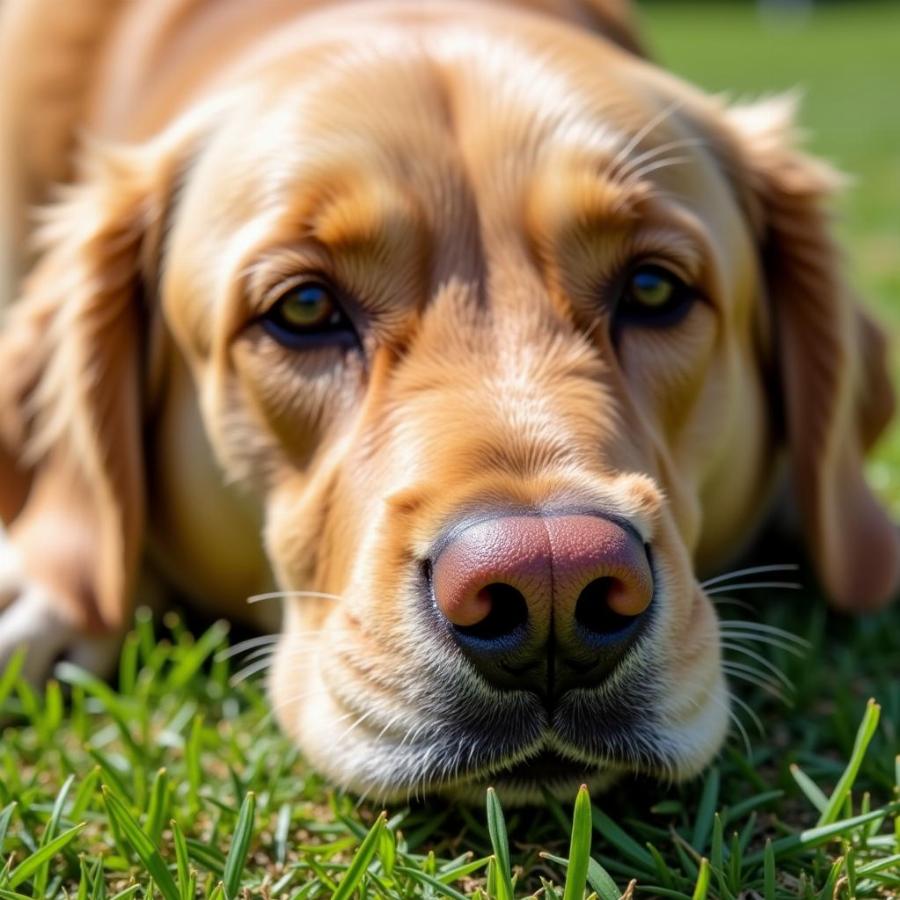A dry nose in dogs can be a cause for concern for many owners. While a dry, warm nose isn’t always a sign of illness, it’s important to understand the potential causes and know when to seek veterinary attention. This comprehensive guide covers everything you need to know about treatment for dry nose in dogs, from common causes to effective home remedies and when professional help is necessary.
Understanding the Causes of Dry Nose in Dogs
Why is my dog’s nose dry? This is a question many pet owners ask. A dog’s nose can become dry for various reasons, some completely harmless and others indicative of a health issue. It’s crucial to observe your dog for other symptoms alongside the dry nose to determine the underlying cause. Simple factors such as dehydration, allergies, or even just lying in the sun can lead to a dry nose. More serious causes can include autoimmune diseases or infections.
Environmental Factors Affecting Nose Moisture
Environmental factors like sun exposure, wind, and low humidity can dry out a dog’s nose. Just like our skin can get dry in these conditions, so can a dog’s nose. Heaters in the winter can also contribute to dryness. Ensuring your dog has access to fresh water and a humid environment can often resolve this issue.
 Dog with Dry Nose from Sun Exposure
Dog with Dry Nose from Sun Exposure
Dehydration: A Common Culprit
Dehydration is a frequent cause of dry nose in dogs. Make sure your furry friend always has access to plenty of fresh, clean water. Encourage drinking by adding flavorless electrolytes to the water or using a water fountain. If you suspect dehydration, consult your vet, especially if accompanied by other symptoms like lethargy or loss of appetite.
Allergies and Their Impact on Nose Moisture
Allergies, whether environmental or food-related, can manifest as a dry, sometimes cracked nose. If your dog is also exhibiting other allergy symptoms like itchy skin, excessive licking, or sneezing, consider allergy testing to pinpoint the trigger.
Home Remedies for Dry Nose in Dogs
Many cases of dry nose can be managed with simple home remedies. However, it’s always best to consult with your vet before trying any new treatment, especially if the dryness persists or worsens.
Keeping Your Dog Hydrated
The simplest and often most effective remedy is ensuring your dog is adequately hydrated. Provide fresh water throughout the day and consider adding moisture to their food with a bit of broth.
Applying Nose Balm
Nose balms specifically designed for dogs can help soothe and moisturize a dry nose. Look for natural, hypoallergenic balms that are free of potentially harmful ingredients. nose anatomy dog can help you understand the sensitivity of this area.
Humidifying the Air
Adding a humidifier to your home, especially during dry winter months, can help maintain moisture in the air and prevent your dog’s nose from drying out. This can be particularly beneficial for dogs prone to dry noses.
When to Seek Veterinary Care
While a dry nose isn’t always a cause for alarm, certain accompanying symptoms warrant a visit to the vet. If your dog’s dry nose is accompanied by lethargy, loss of appetite, vomiting, diarrhea, or nasal discharge, seek professional help immediately.
Signs of a More Serious Problem
A persistently dry, cracked, or crusty nose, especially when coupled with other symptoms like changes in nose color or bleeding, can indicate a more serious underlying health issue.
Can Dogs Get Dandruff?
While we’re focusing on nose dryness, skin dryness can also be a concern. Can dogs get dandruff? Yes, they can, and it often signals underlying skin issues that require veterinary attention. Just like a dry nose, dry skin can be a sign of allergies or other health problems.
Conclusion
A dry nose in dogs can be attributed to various factors, from simple environmental conditions to underlying health issues. Infected callus on dog elbow and other seemingly minor issues can also point to larger problems, so always be observant. By understanding the potential causes and implementing appropriate treatment for dry nose in dogs, you can help ensure your furry friend’s comfort and well-being. Always consult your veterinarian if you have concerns about your dog’s health.
FAQ
-
Is a dry nose always a sign of illness in dogs? No, a dry nose can be caused by various factors, including environmental conditions and dehydration.
-
What are some home remedies for a dry dog nose? Ensuring adequate hydration, applying dog-specific nose balm, and using a humidifier can help.
-
When should I take my dog to the vet for a dry nose? If the dry nose is accompanied by other symptoms like lethargy, loss of appetite, or nasal discharge, seek veterinary care.
-
Can allergies cause a dry nose in dogs? Yes, both environmental and food allergies can lead to a dry nose.
-
How can I prevent my dog’s nose from getting dry? Ensure access to fresh water, use a humidifier, and protect your dog from harsh weather conditions.
-
Are there any specific breeds prone to dry noses? While any breed can experience a dry nose, brachycephalic breeds might be more susceptible due to their facial structure.
-
Is it safe to use human lip balm on my dog’s nose? No, it’s best to use balms specifically formulated for dogs as some human products may contain harmful ingredients.
Beaut Dogs is your trusted source for all things canine. We provide in-depth information on dog breeds, care, health, and much more. Do dogs have ear wax is just one of the many topics we cover. If you need further assistance, please email us at [email protected] for detailed and accurate information from our experts. We’re committed to helping you provide the best possible care for your beloved pet. Beaut Dogs – Your companion in the world of canine care. Sling for dogs back legs might also be helpful if your dog has mobility issues.